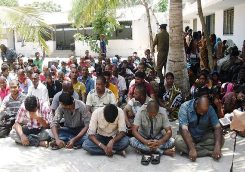By Shastri Ramachandran* | IDN-InDepth NewsAnalysis
CHENNAI (IDN) – Some five weeks after the foreign policy fiasco on the US-sponsored resolution against Sri Lanka in the United Nations Human Rights Council (UNHRC) – which earned the Congress-led UPA government the hostility of all sections in Sri Lanka and the Tamil political parties in India – New Delhi seems to have gone back to sleep on the issue.
The March 21 resolution called upon Sri Lanka to conduct an independent investigation into allegations of violations of international human rights law and international humanitarian law – during the final phase of the 26-year war, which came to an end after Sri Lanka’s army defeated separatist Tamil rebels in 2009.
The resolution on “promoting reconciliation and accountability” in Sri Lanka was adopted by a vote of 25 in favour, 13 against and 8 abstentions. While India voted for the resolution, Pakistan opposed it.
India, speaking in a general comment, said that the resolution provided an opportunity to forge a way forward through national and inclusive reconciliation. India noted with concern that Sri Lanka had not kept its 2009 commitments and called on Sri Lanka to move forward on its public commitments and to take measures to ensure accountability.
“India has always been of the view that the end of the conflict in Sri Lanka provided a unique opportunity to pursue a lasting political settlement, acceptable to all communities in Sri Lanka, including the Tamils,” New Delhi’s Permanent Mission to the UN in Geneva said. Sri Lanka’s elections scheduled for 2013 were an opportunity for its people to exercise their electoral right in a free environment, it added.
The issue of human rights of the Tamil minority in the north-east of Sri Lanka, with its potential to erupt afresh as a crisis, is crying for attention now — before it raises tensions between India and the island republic, and again becomes a flash point in Tamil Nadu, one of the 28 states of India situated in the southernmost part of the country.
Even if the crisis triggered by the UNHRC resolution has passed, the importance of the issue for India’s internal security and foreign policy is not diminished in any way.
The issue is alive and well in Tamil Nadu. The Tamil political parties are only biding their time to raise it again, if only as a stick to attack the Congress party; and in the process, the number of outfits rooting for the cause of Sri Lankan Tamils is growing in the state.
The Tamil Eelam Supporters Organisation (TESO) is all set to whip up the issue again. At a meeting on April 16, which was headed by DMK (Dravida Munnetra Kazhagam) party chief M Karunanidhi, TESO demanded that the Union Government cancel the agreement by which the island of Katchatheevu was given to Sri Lanka in 1974 (despite the then ruling DMK’s opposition). Karunanidhi is determined to keep the issue in focus through a series of public campaigns.
Having quit the UPA (United Progressive Alliance) government, avowedly on the issue of Lankan Tamils, but in reality for electoral reasons, the DMK is bound to keep raising the stakes. Its electoral prospects cannot get any worse in a situation where both the Congress and the ruling AIADMK (All India Anna Dravida Munnetra Kazhagam which split from DMK in 1972) are put on the defensive.
While AIADMK supremo J Jayalalithaa, the current chief minister of Tamil Nadu, is confident that the DMK would not be able to hurt her party’s prospects, the isolation of the Congress (and the UPA) is all too evident in the series of full-page newspaper advertisements spelling out what the Centre has done for the Lankan Tamils. The advertisement betrays the Centre’s anxiety as well as vulnerability on the issue.
Tamil refugees from Sri Lanka
If the Centre has reasons to worry, it is not so much because of the ‘Kazhagams’, the two Tamil parties, but because of the rising tide of Tamil refugees from Sri Lanka flowing into the state. Since the end of the Tamil-Sinhala civil war in 2009, there are at least 108,000 refugees in Tamil Nadu, and less than 70,000 of them are in the refugee camps.
The plight and activities of the nearly 40,000 Sri Lankan Tamils at large is a matter of serious concern. Hundreds of these refugees are heading to Australia. While many have died in the attempt, others have been intercepted on the high seas; besides, streams of these refugees have made their way to other places, such as Dubai.
And, those who fail to reach Australia or get settlement visas in that country, make it to the headlines in Tamil Nadu, providing more grist to the political mill here.
The plight of the Lankan Tamils is a potent weapon in the hands of Tamil parties, and in their eyes Sri Lanka is an “enemy country”. This virtual hijacking of the Centre’s foreign policy prerogative has trapped India-Sri Lanka ties in the competitive parochialism of Tamil parties.
*The author is an independent political and foreign affairs commentator. A version of this article appeared in DNA on April 25 and is published here by arrangement with the writer. Some background information was added by IDN global desk. [IDN-InDepthNews – April 27, 2013]
Picture: Sri Lankan Tamil refugees on hunger strike, demand Indian intervention (March 22, 2013 | Credit: indiatvnews.com
The writer’s previous articles in IDN:
http://www.indepthnews.info/index.php/search?searchword=shastri%20ramachndran&ordering=newest&searchphrase=any
Send your comment | Subscribe to IDN newsletter
Follow us on Twitter and Facebook:
http://twitter.com/InDepthNews
http://www.facebook.com/IDN.GoingDeeper

